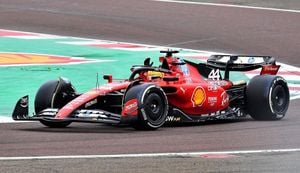South Korea is currently embroiled in controversy as former National Intelligence Service (NIS) official Hong Jang-won testified about the emergency measures enacted by President Yoon Suk-yeol during the national crisis declared on December 3. The testimony has shed light on allegations of political arrests aimed at opposition figures under the guise of national security.
During hearings conducted by the National Assembly's special committee investigating the government’s actions, Hong indicated he had received directives from President Yoon to 'clean house' at the height of the national crisis. "I liked the president. I wanted to follow all orders. But when I saw the list, I couldn't do it," Hong said, unequivocally expressing his moral dilemma when confronted with the political arrest order.
The former deputy head of the NIS revealed he had initially interpreted the president's instructions as relating to countering security threats rather than political targets. On January 22, 2025, he shared his insights during the investigatory sessions, stressing the gravity of the situation and his unease about applying military measures against political figures.
During the hearings, Hong recounted, "When I received the call from the president around 10:53 p.m., I assumed it was about dealing with internal threats, possibly related to spy activities." It was only after communicating with the head of the Military Intelligence Command, Yeon Hyung, did he realize the nature of the orders extended beyond thwarting espionage to including targeting prominent political leaders such as Lee Jae-myung and Han Dong-hoon.
This incident has incited heated discussions about the accountability of top officials during crises. Jo Tae-yong, the current NIS director, vehemently denied any communication of this nature being directed to him, stating, "If Hong had informed me of the directive, he wouldn’t still be here; I would have dismissed him immediately." This disagreement has put the credibility of the testimony and the actions of the NIS under scrutiny.
What followed was this stark divide: Hong's declaration about the nature of the orders echoed the discontent among several officials who felt pressured to act against their moral compass. He revealed, "I felt trapped. Yes, I wanted to adhere to the president’s directives, but my conscience would not allow it. Arresting political opponents is not something hyper-democratic nations do; that's typically seen in more totalitarian regimes, you know, like North Korea."
The gravity of the situation was not lost on the public or the lawmakers convening over the issue. Members of the opposition party have framed these revelations as indicative of the Yoon administration's authoritarian tendencies, underscoring fears of democratic backsliding. The inquiries unearth questions surrounding military and government transparency during such emergencies, with prominent figures now calling for investigations to be broadened.
The opposition has pointed out how these actions, if unfounded, risk not only the stability of the current government but also damage South Korea's international image as it claims to uphold democracy. Following Hong’s testimony, there were calls for Yoon’s administration to clarify the legitimacy and motivations behind their emergency measures.
This drama is not merely about security protocols or the handling of political dissent; the event poses larger questions about the balance between national security and civil liberties. The aftermath of these hearings could very well determine the future political climate and the public’s trust level toward government directives and officials moving forward.
The testimonies heard during the special committee highlight the controversy surrounding the roles and responsibilities of those entrusted with national security. With members of the assembly demanding accountability, the political scenery could be reshaped, pending the fallout from these revelations.
Moving forward, we await to see how this controversy will influence public opinion and whether it will rally support against perceived authoritarianism from the ruling party, shaping future legislative developments. The onus now lies on both the national assembly and the government to placate the growing unrest and uphold democratic principles.
This moment will be watched closely, not only within South Korea but also by international observers eager to see how one of Asia’s democratic bastions navigates the tumult of political strife and governance.



